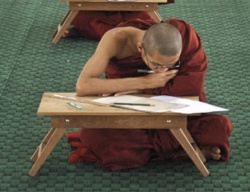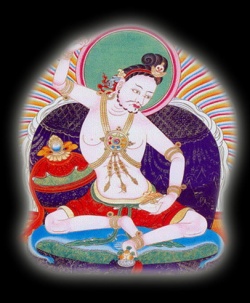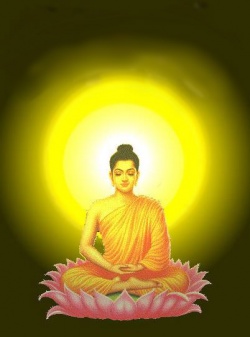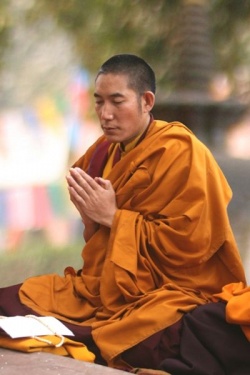Ārya Mañjuśrī Tantra Citta
༄༅། །ཨཱ་རྻ་མཉྫུ་ཤྲཱི་ཏནྟྲ་ཙིཏྟ༔
Ārya Mañjuśrī Tantra Citta
རྒྱ་གར་སྐད་དུ༔
gyagar ké du
In the Indian language:
ཨཱ་རྻ་མཉྫུ་ཤྲཱི་ཏནྟྲ་ཙིཏྟ༔
arya mañjushri tantra chitta
ārya mañjuśrī tantra citta
བོད་སྐད་དུ༔
böké du
In the Tibetan language:
འཕགས་པ་འཇམ་དཔལ་རྒྱུད་ཀྱི་ཡང་སྙིང་༔
pakpa jampal gyü kyi yang nying
pakpa jampal gyü kyi yang nying
In the English language: The Quintessence of the ‘Mañjuśrī Tantra’: Mañjuśrī Nāmasaṃgīti—Chanting the Names of Mañjuśrī
འཇམ་དཔལ་གཞོན་ནུར་གྱུར་པ་ལ་ཕྱག་འཚལ་ལོ༔
jampal shyönnur gyurpa la chaktsal lo
Homage to Mañjuśrī, the youthful!
འདི་ལྟར་སངས་རྒྱས་བཅོམ་ལྡན་འདས༔
ditar sangye chomdendé
Like this, you are an awakened one, transcendent accomplished conqueror,
ཡེ་ཤེས་སྐུ་སྟེ་རང་བྱུང་བ༔
yeshe ku té rangjungwa
A wisdom body that arises naturally by itself.
ཡེ་ཤེས་མིག་གཅིག་དྲི་མ་མེད༔
yeshe mik chik drimamé
Wisdom’s single eye that is not stained by any obscuration;
ཡེ་ཤེས་སྣང་བ་ལམ་མེ་བ༔
yeshe nangwa lammewa
Wisdom’s light that shines in brilliant clarity:
ཨ་ར་པ་ཙ་ནཱ་ཡ་ཏེ་ན་མ༔
a ra pa tsa na ya té nama
To you who ripen all sentient beings, I pay homage!
ཡེ་ཤེས་སྐུ་ཉིད་ཁྱེད་ལ་འདུད༔
yeshe ku nyi khyé la dü
Wisdom’s very embodiment, to you I pay homage!
རྫོགས་པའི་སངས་རྒྱས་ཀུན་གྱིས་བཤད༔
dzokpé sangye kün gyi shé
All the fully enlightened buddhas: this is what they taught.
བཅོམ་ལྡན་འདས་འཇམ་དཔལ་ཡེ་ཤེས་སེམས་དཔའི་དོན་དམ་པའི་མཚན་ཡང་དག་པར་བརྗོད་པ༔
chomdendé jampal yeshe sempé döndampé tsen yangdakpar jöpa
‘The Perfect Recitation of the Ultimate Meaning of the Names of the Transcendent Lord, the Wisdom Being Mañjuśrī’,
བཅོམ་ལྡན་འདས་དེ་བཞིན་གཤེགས་པ་ཤཱཀྱ་ཐུབ་པའི་ཞལ་ནས་གསུངས་པ་རྫོགས་སོ༔
chomdendé deshyin shekpa shakya tubpé shyal né sungpa dzok so
spoken by the transcendent lord, the tathāgata Śākyamuni, is complete.
གཏེར་མའོ༔ གུ་རུ་པདྨས་ཇོ་མོ་ཤེས་སྒྲོན་ལ་གནང་བའང་མཚན་བརྗོད་ཚར་རེ་དང་མཉམ་པར་གསུངས་སོ། །ཟླ་བ་གཅིག་གིས་འགྲུབ་པར་ཐེ་ཚོམ་མ་ཟ་ཅིག། །།
This is a terma. Guru Rinpoche proclaimed to Jomo Shedrön that reciting this prayer is equal to reciting the whole of the Mañjuśrī Nāmasaṃgīti…
| Rigpa Translations, 2011



